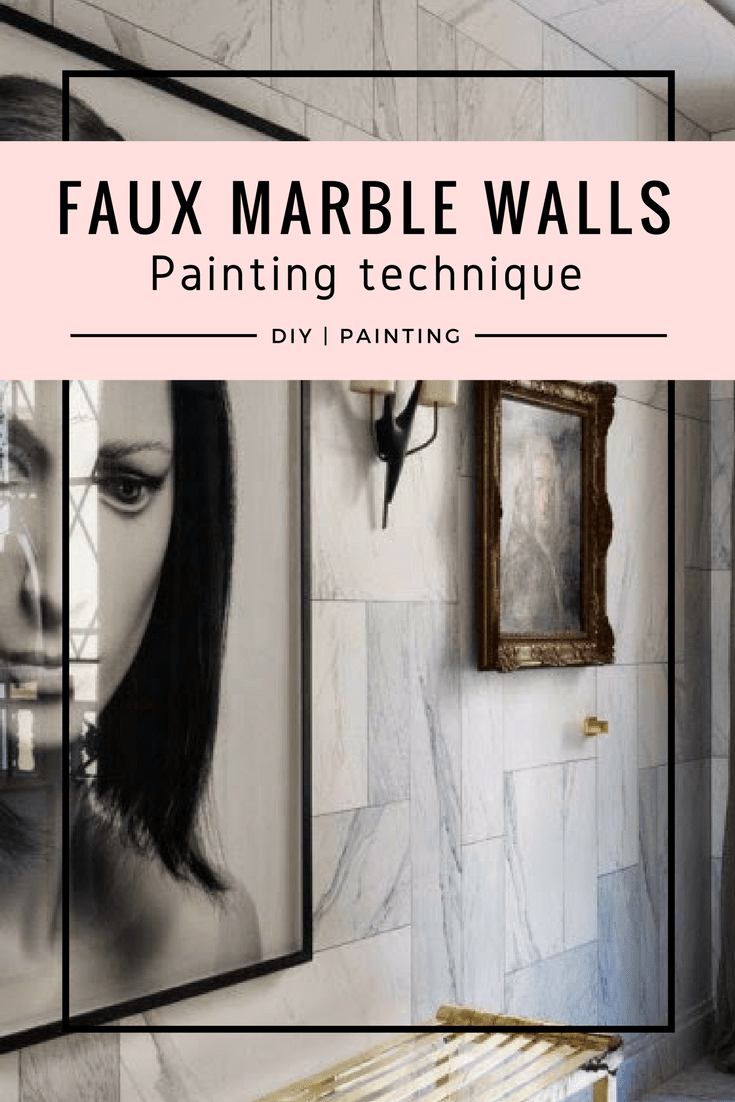
Let's face it, if marble floors shout "expensive", marble walls take it to a whole different level. Genuine marble of course lasts a few lifetimes and in some countries is extensively used as means of keeping a home cool (like in my native Greece).
A genuine marble wall in a home, however, entails not only major expense, but a major remodel. So rather than undergoing such an extreme project, repainting a wall in a faux marble finish results in that classy marble look at a fraction of the cost.
Have you heard of marbling or marble painting effects? If you think that you need to be a Botticelli to achieve the look, this guide will inspire you and possibly convince you that to create this effect is moderately easy. I know, because I tried it once (on a canvas. And then chickened out in transferring the look on the wall).
The beauty of learning how to faux marble paint is that you can create the look of the specific marble variety you like, or tweak the technique to come up with your own unique marble colours. The possibilities are endless as they say.
And while I have written this post with walls in mind, you can actually use the technique on furniture, desks, anywhere really.
Basic Technique of painting a faux marble wall
A basic faux marble finish technique -- standard white marble with grey and black veins -- is beneficial to learn, regardless of the type of marble you wish to recreate with paint.
The look begins with a primed and painted latex white wall and a paint tray with grey latex glaze in it. The glaze is simply a little grey paint with glaze mixed in, based on proportions recommended on the glaze container. The more glaze, the more translucent the finish.
Start by blotting the grey onto the wall to create bands of cloudy grey areas, then smooth some of that out with a dry feathering brush or another sponge dipped in white paint.
A brush creates thick grey squiggly bands of paint for added realism. A feather dipped in grey or black creates fine veins, which can be softened by blotting with a sponge or rag. The feather, or a fine artist's brush if you don't have one, is key to the marble vein look.
An alternative technique is described in this video and this is the one I have used. In the video you are advised to use 2-3 different colours - complimentary to the look you are trying to achieve.
Layers of Color in the faux marble painting technique
Not all marble is black and white; many beautiful varieties don't contain plain black or plain white tints at all. Pinks and tans are common to Italian marble used in sculpture and as tiles.
To recreate the complexity of multicoloured marble, note the colours in a marble variety that you like, and pick three or four paint colours based on the true marble. Apply one of the middle shades as your base coat colour.
When that's dry, pour a pool of each paint colour into a large tray, dipping a sea sponge into one of the darker colours. Blot that colour on, then some of the lighter shades, using the same sponge.
The multiple paints on the sponge will create the multiple shades in the marble. Add veins with a feather, mimicking the vein colour of the genuine marble, just like shown on the video above.

Above: Faux marble fireplace in Nikki Haslam's pad. Photo: Simon Upton for T Magazine of the New York Times.
Below: Here are some photos of distinguished French Interior Designer's Jean Louis Deniot's Paris flat. Amazing marble walls right? WRONG! Amazing FAUX marble walls! Photos: Simon Upton for Elle Decor.



How can I paint in faux marble effect?
If you want to find out how to paint a faux marble effect on furniture, click on the photo below to see a quick tutorial by DULUX TRADE to help you get started.
So, will you be giving it a go?
Jenny Kakoudakis likes to blog about interiors. She launched award-winning Seasons in Colour in 2014 and the luxury interior design blog All The Pretty Homes in 2024. When she is not chasing criminals out of the financial system (her day job), she gets creative by redecorating her own home.
